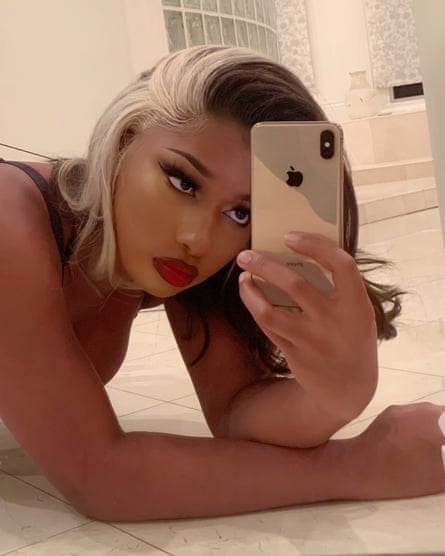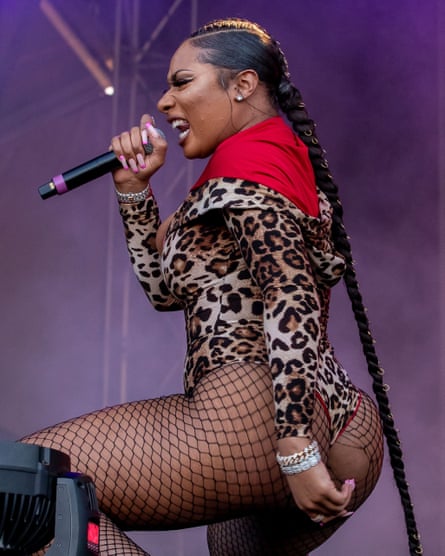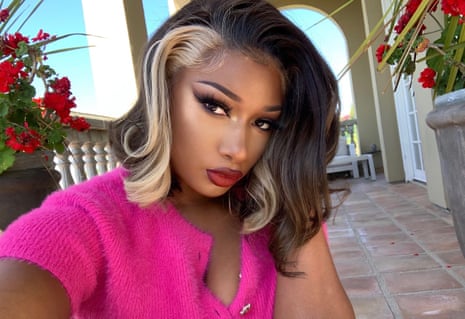Given that her lyrical prowess has made her one of the hottest rappers in the US, it’s hardly surprising that Megan Thee Stallion is good at anecdotes. We’re talking over Zoom – Megan looking impeccably high-glam, worthy of a Real Housewives reunion – as she regales me with how she ended up recording a remix with her idol.
“I got a call: Beyoncé wants to do a remix to Savage,” she says, shaking her head with disbelief. “And I was like ... what? Shut up. Shut up. You’re lying. Beyoncé don’t want to get on nothing with me. Come on, it’s me! I know I’m Megan Thee Stallion, but dang!”
While a Beyoncé remix would be a career milestone for any artist – and Savage duly caused a sensation when it was released last week – Megan Thee Stallion fans knew it would be especially meaningful to the Houston native who has spoken nonstop of Queen B as an inspiration. Megan Pete grew up in the South Park area of Houston, Texas, not too far from the Third Ward where Beyoncé was raised. Fittingly, proceeds from their collaboration will be donated to Houston nonprofit Bread of Life, which has been distributing supplies to families during the pandemic.
“You grow up and you friggin’ watch Destiny’s Child, and you go to the rodeo to see them perform ... you don’t grow up and think you’re gonna meet Be-yon-cé!” she gushes. “When I heard the song for the first time I was like: no. And it’s only like, year two? And we on quarantine? Who does that?”
Megan bounces between the giddiness of an artist still struggling to believe just how big she’s become and the self-assuredness of someone long in the game. The past two years have been a blur of back-to-back wins for the 25-year-old, from the mixtape and EP releases Fever and Suga – both Top 10 in the US – to securing a role as a judge on HBO’s forthcoming ballroom competition series, Legendary. Savage was already dominating social media for the past month, thanks to a TikTok dance challenge, and the remix has secured her first ever US Top 5 single this week. When we speak, she’s in the midst of recording her highly anticipated debut album, appreciative of the extra time lockdown has afforded.
“Not having a lot of people trying to give me an opinion has definitely unlocked a different level of creativity,” she says. “Now, I don’t have anybody that I can necessarily play it for because, who in the house? It’s just me, reassuring myself that I like what I’m writing, and I like the beats I’m choosing. So when it comes out, it’ll be 100% Megan: 100% Megan’s opinion, 100% what Megan wants.”
Authenticity has always been integral to her appeal; pop stars often speak in empty platitudes about the importance of “being yourself”, but Megan has consistently done as she pleases. Take, for example, her decision to complete her bachelor’s degree at Texas Southern University despite her dizzying ascent, to aid opening assisted living facilities in Houston. “I want to tell that story to people that, even though I was chasing my dream, I still was able to get my education,” she says. “I really want young girls to want to go to college. My grandma and my momma will be so proud too.”

There is no tension between her slick, shit-talking rap persona and the wholesomeness she displays off of tracks. Her confidence is symbiotic, with female listeners feeding off of it as opposed to feeling alienated. Her “hot girl summer” meme turned movement she coined last year was fuelled by her commitment to positivity of all kinds, be it sex or body (when a fan asked if it was plus-size friendly, her response was: “Of course!”). Months later, a hit song of the same name was released, featuring Nicki Minaj and Ty Dolla $ign.
The redefining of a “hot girl” as something inclusive has resonated with fans (who she affectionately dubs “hotties”) even more so because it’s fronted by someone like her. Her stage name references a term used in her home town to describe women who are “tall and fine” (she’s 5ft 10in). In middle school, she was the captain of the cheerleading team. While she could easily evoke the “unfriendly black hotties” characterised in the American teen comedy Mean Girls, her mantra is very much, reversing that movie’s line, “you can sit with us”.
“Mean Girls is my favourite movie!” she laughs. “I’m definitely a friendly black hottie. It really takes a lot of effort to be a bitch, you know? So it’s really easier to be nice than it is to be mean.”
This has been her approach when it comes to music. Though beef is a staple of the genre, and a cattiness stereotype plagues women in rap, she has struck up visible friendships with female rappers such as Rico Nasty, Maliibu Miitch, Lizzo and Kash Doll, and had Minaj on a song that sampled Miami rap duo City Girls. In a genre that continues to pit women against each other, she remains the quintessential girl’s girl, stressing she favours collaboration over competition.
“Women, we naturally want to be the best,” she says. “And I can’t be mad at the next girl for wanting to be the best! Why would I get mad at you for saying you the baddest? Why can’t we both agree that we bad, and that just be that?”
This is an attitude that harks back to a previous female rap golden age. Megan was just one in 1996, when the link-up Ladies Night was released, featuring Lil’ Kim, Missy Elliott, Angie Martinez, TLC’s Left Eye and Da Brat. Two years later, Vibe magazine ran its Rap Reigns Supreme cover, fronted by Foxy Brown, Lil’ Kim, Missy Elliott and Lauryn Hill. Then came years of relative drought for women in rap. But the landscape for women has now never looked so fertile, with a plethora of diverse artists forcing the industry to push past gendered framings: Doja Cat, Saweetie, Tierra Whack and more in the US; Little Simz, Ms Banks and Stefflon Don and others in the UK.
According to Megan, the time when “the world thought it could only be one queen” has passed. “Women, we were always great,” she says. “When a woman raps, majority of the time, she’s really rapping – she actually spitting.”
A rappers’ rapper, her ability to go bar-for-bar with the best has accrued street credibility – indeed, her laser precision and breakneck delivery is an antidote to the lethargy of many male “mumble rappers”. Every punchline is a knockout and her flow forceful, with her high energy both a throwback and breath of fresh air.

Misogynistic questioning of her ability was quashed as soon as she burst on to the scene with her first mixtape, 2016’s Rich Ratchet, followed by Stalli (Freestyle) and the Make It Hot EP the following year; the sultry Tina Snow mixtape arrived in 2018, where she channelled her biggest influence: late Texan rapper Pimp C and his alter ego Tony Snow. Its breakout single Big Ole Freak was the first of Megan’s songs to chart on the Billboard 100. Her arrival in the mainstream came via the libidinous Fever, brimming with unapologetically freaky filth – “men get stiff, they call me Medusa” – where she demands satisfaction.
Women have been central to her rise. Megan’s mother, Holly Thomas, who died last year from brain cancer, was a debt collector who doubled as a rapper known as Holly-Wood, and was Megan’s first manager. As a child, Megan tagged along to studio sessions, listening to her mother spit through the walls. “It was normal,” she tells me. “It was: OK. Ladies are rappers. This is what my mom is doing.” She quietly decided she would follow in her footsteps, but was short on the confidence she has now. “I would start stealing [my mother’s] CDs, the instrumentals. And I would write, and I would just always keep it to myself – nobody knew I wanted to be a rapper.”
Megan is known for her freestyles. Her first took place at a college party aged 18, where she hoped to catch a guy’s eye. “All the boys were rapping. This one boy, he was real fine and I was like: I got to let him know that I can rap too, I can’t be in here just acting shy. I had to just step in the circle.”
After winning over the room with her quick wit and flow, it was her best friend, Kelsey Nicole, now her assistant, who created her a YouTube channel and uploaded a video of her freestyling in her dorm room that soon went campus-viral. Word of her talent reached her home town and she decided to play her music to her mother. Thomas, despite raising her on the Notorious BIG, Lil’ Kim and UGK, was shocked by the explicit content and insisted she start her music career at 21.
“She was like: ‘Oh my gosh Megan, where did you get this potty mouth from?’” Megan cackles. “‘Who taught you these words?’ And you have to know, my momma was real gangsta – she cursed a lot. I’m like ma, I can’t believe you don’t know where I got it from!” Three years later, in 2016, she drove Megan to the local rooftop “cypher” freestyle session that would birth a star. One of only two women present, wearing a pair of short shorts and tall heels, she obliterated Drake’s 4pm in Calabasas and set social media ablaze.
It would not be the first time she would break the internet. Like a new generation of internet savvy rappers such as Cardi B and Lil Nas X, Megan is “extremely online”. When rumours of a romance with rapper G-Eazy began to swirl after he posted an Instagram story showing him kissing her cheek, she clapped back in a tweet that he simply “liked the taste of Fenty” makeup. Earlier this year, she entered into a legal dispute with her record label 1501 Certified Entertainment, and repeatedly explained her side of the case on Instagram.
But her visibility online means she is acutely scrutinised; she’s had to repeatedly shut down speculation that her physique is down to cosmetic surgery. If she is so much as photographed next to a member of the opposite sex, it’s assumed they’re dating. Even her well-documented love of anime has bizarrely been the subject of angry online commentary, by those who believed she must be faking it for attention.
“I had to learn that on the internet, people really just be talking,” she sighs. “A person might have said something super ugly to you, that you carry with you for the rest of the day. But that person that said that shit? They’re not even thinking about it no more! It don’t matter that much to you, so why should it matter that much to me?”
She does note, however, that “social media really puts fuel in the hate train”, borrowing the term Minaj used to describe her own backlash in recent years. There is certainly a culture building women up online, only to tear them down once they hit the peak of their success. Tiffany Haddish, Cardi B, Chrissy Teigen – these are just some women who were unanimously worshipped before their hypervisibility began to grate. I ask her if this is something that worries her at all.
“I can’t be living my life worrying about what people think about what I’m doing,” she says with a small shrug and chuckle. “If I did, I would never be me. I wouldn’t be doing what I’m doing right now. And I must be doing something right!”
